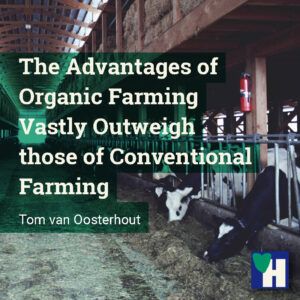
The advantages of organic farming vastly outweigh those of conventional farming. However, the conversion from conventional to organic food production is one of the most challenging endeavors of the 21st century.
To illustrate the truth of both these arguments, I will explain what the challenges are of the conversion. I use the results from a research assignment two of my colleagues and I performed in 2002 and 2003 in The Netherlands.
A provincial board decided to join the national endeavor for an organic agricultural area of 10% in 2010. The most obvious expansion of organic agriculture in this province is that of organic dairy farming.
The most interesting aspect of the method we used is that it’s applicable in any debate about organic or conventional farming. Even in your personal life, the questions we asked are a very powerful tool to search for your own change potential.
Some of the links are affiliate links. As an affiliate associate, we earn a commission when you purchase any of the products offered through the shared links at no extra cost for you. This helps us maintain this website.
Table of contents
Search for change potential
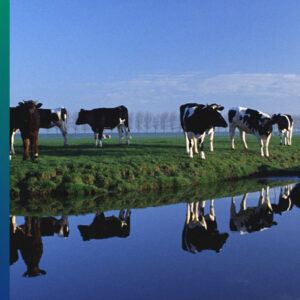
The problem was though that the growth of dairy farming in this province lagged. We were asked to investigate whether it would be possible to expand organic dairy farming and if so how.
Our research was conducted according to the book. We analyzed relevant literature. Talked with countless conventional and organic dairy farmers and key figures in the production chain (factories and retail), and government authorities.
To get an indication of the change potential of the dairy farmers, we used an analytic model based on the following questions:
- Do those involved share a common vision?
- How do farmers perceive the effectiveness of their performance?
- What is the influence of the social environment on the farmers?
- What are the situational conditions?
- What tools are available for the farmers to get feedback on achieved results?
Criteria for the analysis
To be able to interpret the outcome of our research from the perspective of the advantages of organic farming, it’s important to understand some of the criteria used in the analysis.

A shared vision is a complex of ideas based on the assessment of the physical, social and economic environment. It is the farmers’ ideology.
Perceived performance
The perceived performance consists of some simple criteria, the farmers’ perception of his or her capacities, his or her performance, and the idea to be able to contribute to desired goals.
Social environment
The dairy farmers’ social environment consists of many actors: colleagues, suppliers, consultants, the veterinarian, the dairy cooperation, the customer, and family and friends.
Situational conditions
Situational conditions have a substantial impact on the farmers’ performance. However, the farmer can hardly influence these conditions. The most important are: market developments (price, supply, and demand), legislation and regulations, financing and technical possibilities, and the physical environment.
Feedback tools
Most dairy farmers only use two feedback tools to control their efforts: economic (costs and income) and production (kilograms of milk). The challenge is to also develop feedback tools measuring environmental (air, water, biodiversity), animal welfare, and food safety objectives.
Conversion without an effort
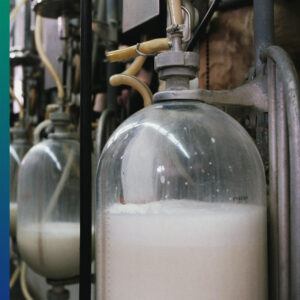
In the province we investigated, there were 1,421 dairy farmers in 2002 and 2003. Only 40 of them were organic. Altogether, the farmers produced 574 million kilograms of milk a year. The growth in the number of organic dairy farmers lagged behind compared to the national growth.
This is striking because the conventional dairy production in this province is very extensive. This means that the conventional dairy farmers could very easily convert to organic. As a matter of fact, almost without any effort.
Of course, the business operations, the management of the farm had to change. However, this was the same all over the country. Moreover, in the years preceding our research, the dairy industry and supermarkets invested heavily in expanding their organic dairy sales. Why did this province lag behind?
Related: There are Many Ideal Protein Alternatives for Cow’s Milk
The advantages of organic farming: a world apart
Already in the first stage of our research, it appeared that conventional and organic dairy farmers did not share the same vision. They live in separate worlds. The conventional dairy farmers believe that the differences between conventional and organic farming, substantiate beyond the control of the individual farmer.
The conventional farmers believe that the so-called situational conditions, such as the market, laws and regulations, technical and financial possibilities, and the lack of pasture, determine the possibilities to farm.
In contrast, the organic farmers emphasize the substantial similarities between conventional and organic dairy farming. Organic dairy farmers also cherish the management skills required to operate an organic dairy farm. Conventional dairy farmers have far more doubts about their own farming capacities.
Moreover, the debate about conversion to organic is also burdened by ideological controversies. This is attributed to the lack of hard and unambiguous performance criteria for organic dairy farming. However, organic and conventional dairy farms use the same, predominantly economic, conventional feedback tools. The difference is that organic farmers are also aware of the impact of their efforts on the environment, animal welfare, and food safety.
Related: Conventional Farming versus Organic Farming: the Unfair Comparison
Who is responsible?
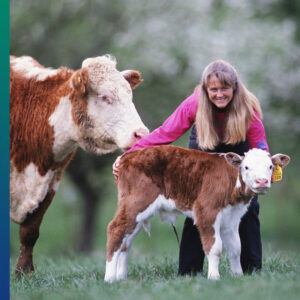
All those who are involved in dairy farming, whether in production or in distribution, agree on one thing: the demand for organic dairy executes a key role in expanding the supply. They’re also all convinced that retail has the main task to increase demand. But the biological dairy products in the supermarket generally differ very little from the conventional products. Which hampers growth in sales.
Moreover, one should not underestimate that a significant expansion of the demand, also requires a significant expansion of the capacity of the dairy industry, and in the number of organic dairy farmers. Based on the 10% – target of this province, the number of organic dairy farmers needs to grow from the current 40 to between 140 and 170.
Based on our research we concluded that it should be possible to expand organic dairy farming in this province. However, the desire to convert to organic is very small among the conventional dairy farmers. Moreover, the target of 10% can almost only be achieved when the farmers, the industry, and retail combine their efforts. This is almost impossible because no one feels responsible for the realization of this target.
Recommendations
Based on our research, we offered the following recommendations. The first is that organic farming should much more be seen as an individual choice of an individual farmer. A farmer who capitalizes on the specific demand he or she identifies in the market.
The second recommendation is that there is a need for clear and unambiguous criteria and indicators, which provide feedback on the environmental, animal welfare, and food safety ambitions of organic farming.
The third recommendation is that a gradual growth of supply and demand of organic dairy is only possible when farmers, the industry, and retail arrange a contractual deal.
Even when these recommendations are taken to heart, the growth of organic dairy farming remains a big challenge. Specifically, conventional dairy farmers should pick up this challenge. In the end, it’s their stubborn belief that they lack the capacity to convert, which obstructs the serious growth of organic.
The personal challenges, which come with the advantages of organic farming
Why should we question our own beliefs when it comes to organic farming? There are many advantages of organic farming: the environment, animal welfare, and food safety are all better off.
Related: Go for a Green Lifestyle and Invest in Powerful Future Generations
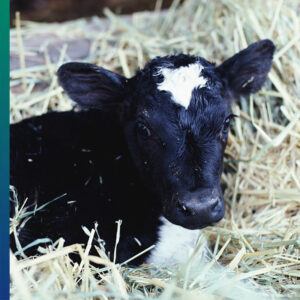
How can we change our beliefs when it comes to organic farming? Start to answer the first question: who is responsible? The answer is: we all are responsible.
Next, we need to answer the following five questions on a very personal and responsible level:
- Are my ideas, is my ideology based on facts?
- What capacities do I need to profit from the advantages of organic farming?
- Who holds me back?
- What holds me back?
- Do I care for the environment, animal welfare, and food safety?
Even when you answer these questions to your satisfaction, the conversion to organic is a very big personal and family challenge. However, the world will only improve when we all make the effort to face our challenges.
What are your answers to these questions? Please respond in the comment box.



As the world is changing so fast, many people are looking to get healthier food and this is the reason why organic farming is the way to go now, I’m lucky to live in the country in Canada, when I moved here there were no organic farmers around here, today it’s not hard to see some people are working on their organic farms with success and they produce all kind of food, including dairy products. I’ve seen these farmers starting small and I’ve seen how their farms are growing good, this takes me to think there are many people interested to get healthier food to their tables and they are willing to pay the extra money to these farmers for their work.
Hi Alejandra,
Thank you for your comment. Always appreciated.
I’m very glad to read that in Canada organic farming is on the rise. A very good friend of mine, who’s one of the world’s most renowned dairy farming experts, invested a lot of time in trying to educate Canadian and US dairy farmers about sustainability.
Although our personal health is an important issue when it comes to organic farming, I cannot state often enough, and with some emphasis, that biodiversity, and clean air and water, and healthy soil are equally important. I’m convinced you share my beliefs in this.
For now, stay safe, stay healthy.
Regards,
Tom
Organics in my eye is just a bit overrated. Now I do like your post, it is very informative and I’m not saying they’re bad or anything they charge too much for them. I worked at Walmart and the price differences are crazy but yes if we could all eat and drink organic it is definitely better for you.
Thank You,
Bill Wright
Hi Bill,
Thank you for your comment.
The problem is not that organic food is too expensive. The problem is that conventional food is too cheap.
Some 80 kilometers from where we live, there is the biggest inland lake in Europe with an open connection to the sea (The Mediterranean). Last year this lake was polluted with pesticides which runoff from flooded farmlands, killing all plants and animals. The water is now dead.
Now, an investment is required of 200 million euros to restore the lake. This money is taxpayers’ money, which could have been invested in other and more appropriate causes. What do the English say? It’s too late to lock the stable door after the horse has bolted?
I’m afraid the Walmarts of the world, and the consumers who buy there, are not investing in a better world. At the same time, they are all complaining. They believe they have to pay too much taxes, that these taxes are not well spent and that there are too many public sector workers. They all have short-term memories, forgetting that most of their tax money is required to clean up after them.
For now, stay safe, stay healthy.
Regards,
Tom
I have seen a protest of this similar in my country. I agree that organic farming is the future of farming. Conventional farming is good to get mass produce quickly. However, the stuff produce might not be healthy enough as the organic farmers provide. Thus it is important farmers take a step to change their methods that is good for the environment and for us humans.
Hi Bernard,
Thank you for your comment. I’m glad you agree.
Unfortunately, there are many misconceptions about organic farming. You ventilate one: “Conventional farming is good to get mass produce quickly.” Organic farming can produce quickly and on a massive scale as well.
The problem is that conventional farmers all lost the ability to farm. Farming requires many skills. Conventional farmers outsourced all these skills to so-called experts. These experts are paid by the food industry.
The food industry is only interested in fast, cheap, and predictable. They’re not the least interested in the environment, biodiversity, or your health.
With all kinds of unfair financial schemes, the food industry enslaves farmers. Farmers enslave their workers. This vicious circle can only be broken by the consumers. Stop buying conventional, we must all and only buy organic. And stop eating meat every day. Once a week is more than enough and way better for your health.
For now, stay safe, stay healthy.
Regards,
Tom
Thanks for the amazing article. You did great research. And you also gave us some amazing questions to ask ourselves.
However, I’ll talk about one thing that bothers me – the price of organic foods. It’s just too way high, and if you’re on an average budget, there’s no way that you can buy everything organic.
When I was a child, we would plant our own tomatoes, potatoes, onions, etc. If I remember, it didn’t cost a lot, and the results were awesome. However, when I go to the shop and try to buy that “organic” potato, the price is 3-4 times higher than the conventional one.
It’s just too big a difference. Instead of a $5 meal, you eat a $20. That’s the biggest problem, I think. Everyone is aware that organic food is healthier and better, but the price makes people buy conventional products.
Hi Petar,
Thank you for your comment and compliments. You noticed organic farming is one of my favorite topics.
I think I’ve explained this already a few times, but I cannot explain it enough. The problem is not that organic food is too expensive, conventional foods are too cheap.
The problem with conventional foods is that the costs of the destruction of the ecosystems and biodiversity we depend upon are not passed on to the consumers. At least not to the current consumers. We shift the bill for our ‘low pricing-high damage’ to the next generations.
It’s even worse. At the moment we pass on the bill of our cheap conventional food production and consumption to the poorest people of the world because we destroy the ecosystems they depend upon. In my opinion, this is a crime against humanity.
There is also another problem we have to deal with. An American epidemiological study revealed that a disproportionate number of farmhands working on conventional foods died of COVID-19. This is attributed to the exuberant use of pesticides.
This might also explain the disproportionate number of deaths amongst the eldest because they grew up with the use of pesticides that are now banned. Although no conclusive evidence exists when it comes to this.
For now, stay safe, stay healthy.
Regards,
Tom